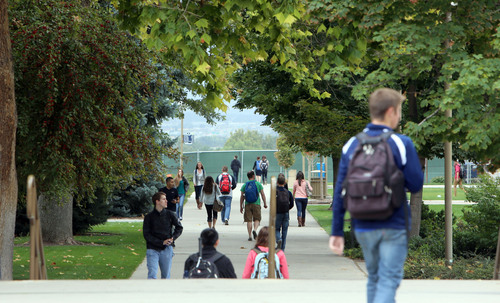This is an archived article that was published on sltrib.com in 2014, and information in the article may be outdated. It is provided only for personal research purposes and may not be reprinted.
The number of Utahns with a college degree is growing, but not fast enough, a report released this week found.
The portion of working-age adults with an associate or bachelor's degree inched up 1.1 percentage points, to 40.4 percent, between 2011 and 2012, according to an analysis of U.S. Census numbers by the Lumina Foundation.
"We still have a lot of work to do," said Utah Commissioner of Higher Education Dave Buhler. "While the statistics are improving, we're not getting there fast enough."
Utah is above the national average of 39.4 percent, and the report released ranked the Beehive State at No. 19 in the country, up a spot from last year.
But Utah is still behind job-market demands, said Dewayne Matthews, vice president of strategy development at Lumina, a group with a goal of having 60 percent of Americans with a college degree by 2025.
"States that are interested in growing their economy, they need better-educated people," said Matthews. "For individuals who want the opportunity to be in the middle class, raise a family, save money for retirement, they need postsecondary skills."
Though the number of educated Utahns grew more than in years past, it's not enough to meet the state's ambitious education goal for 66 percent of the workforce by 2020. Utah counts the number of graduates a little differently than Lumina by including those with certificates, putting the current portion of those with postsecondary education at 45 percent.
The increase reported Tuesday in the report could be due to the record enrollment growth Utah institutions saw during the recession, Buhler said.
"If you think about those who came to college in 2007, 2008," he said, "some would be graduating now."
So how to grow the number of graduates more quickly? One way might be to help people who started college but didn't finish their degrees. Nearly 28 percent of Utah adults have some college credit but didn't graduate — the third-highest portion in the country.
"It's a huge number, over one-quarter of all Utah adults," said Matthews.
If those people finished their degrees, the state's educational attainment rate would be above the 66 percent goal.
And according to Lumina's research, many of those people want to finish.
"Most of them would like to complete the degree; they see the value in [it]," Matthews said. "But it's hard for them to know how to go back. They feel like they have few options open to them and they're not sure they are welcome."
State leaders are also looking at helping people finish with a $200,035 grant from the Gates Foundation.
"We need to understand more; is there anything that would get people to come back and finish, or are they at a point where they're settled in their career?" Buhler said. "I don't think we have any data on that."
Also important, though, is bumping up the state's relatively low graduation rates to ensure that the number of people who attended college but don't have degrees doesn't grow. "We have to attack from both directions," Buhler said.



